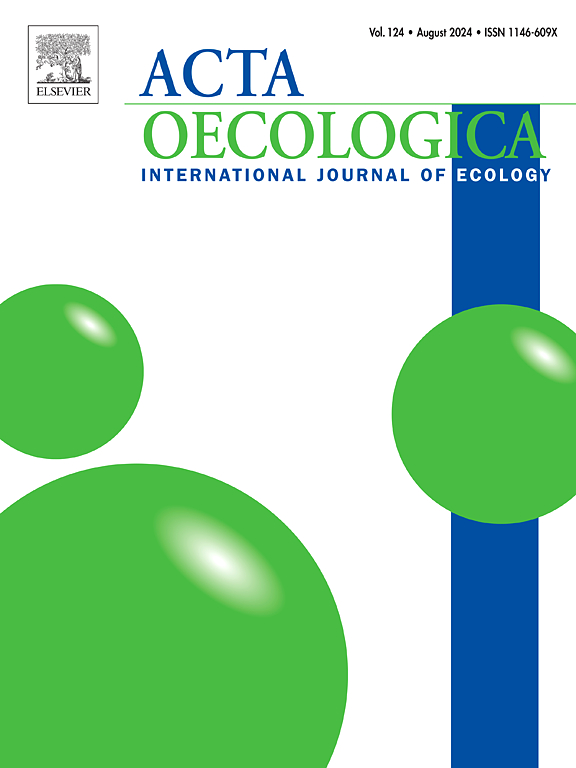种子沉积模式反映了哺乳动物种子传播者的觅食行为和食物习性
IF 1.3
4区 环境科学与生态学
Q3 ECOLOGY
Acta Oecologica-International Journal of Ecology
Pub Date : 2025-09-01
DOI:10.1016/j.actao.2025.104111
引用次数: 0
摘要
在通过动物肠道传播的过程中,种子通常与多个同种和/或异种种子一起沉积,潜在地增加了幼苗竞争的强度。种子传播者物种的觅食行为、食性、体型等生态特征可能影响粪便中种子的组成和密度。为了评估种子传播者的生态特性如何影响种子的竞争环境,我们比较了三种哺乳动物种子传播者——貂、貉和狐狸——粪便中的种子组成和密度,这些物种在觅食行为、食物习惯和体型上都存在差异。收集粪便样本105份,记录种子9385粒,鉴定出8种植物。粪便中的种子组成在三种分散物种之间存在显著差异。貂粪主要由黑貂(Malus toringo)组成。相比之下,浣熊狗和狐狸的那些是由更多样化的植物物种组成的。貂和貉粪便中的种子密度往往高于狐狸。这些结果表明,幼苗的竞争环境因分散物种的生态特性而异,对幼苗的形成可能有不同的影响。本文章由计算机程序翻译,如有差异,请以英文原文为准。
Seed deposition patterns reflect the foraging behavior and food habits of mammalian seed dispersers
In endozoochorous seed dispersal via animal gut passage, seeds are often deposited together with multiple conspecific and/or heterospecific seeds, potentially increasing the intensity of seedling competition. Ecological characteristics of the seed disperser species, such as the foraging behavior, food habits, and body size may influence seed composition and seed density in feces. To evaluate how the ecological characteristics of seed dispersers influence the competitive environment for seedlings, we compared the seed composition and density in the feces of three mammalian seed disperser species, martens, raccoon dogs, and foxes, that differ in foraging behavior, food habits, and body size. We collected 105 fecal samples, recorded 9385 seeds, and identified eight plant species. Seed composition in feces differed significantly among the three disperser species. Marten feces were primarily composed of Malus toringo (Siebold). In contrast, those of raccoon dogs and foxes were composed of a more diverse array of plant species. The density of seeds in feces tended to be higher in martens and raccoon dogs than in foxes. These results suggest that the competitive environments of seedlings differ depending on the ecological characteristics of disperser species and may have differential effects on seedling establishment.
求助全文
通过发布文献求助,成功后即可免费获取论文全文。
去求助
来源期刊
CiteScore
3.60
自引率
0.00%
发文量
57
审稿时长
>0 weeks
期刊介绍:
Acta Oecologica is venue for the publication of original research articles in ecology. We encourage studies in all areas of ecology, including ecosystem ecology, community ecology, population ecology, conservation ecology and evolutionary ecology. There is no bias with respect to taxon, biome or geographic area. Both theoretical and empirical papers are welcome, but combinations are particularly sought. Priority is given to papers based on explicitly stated hypotheses. Acta Oecologica also accepts review papers.

 求助内容:
求助内容: 应助结果提醒方式:
应助结果提醒方式:


